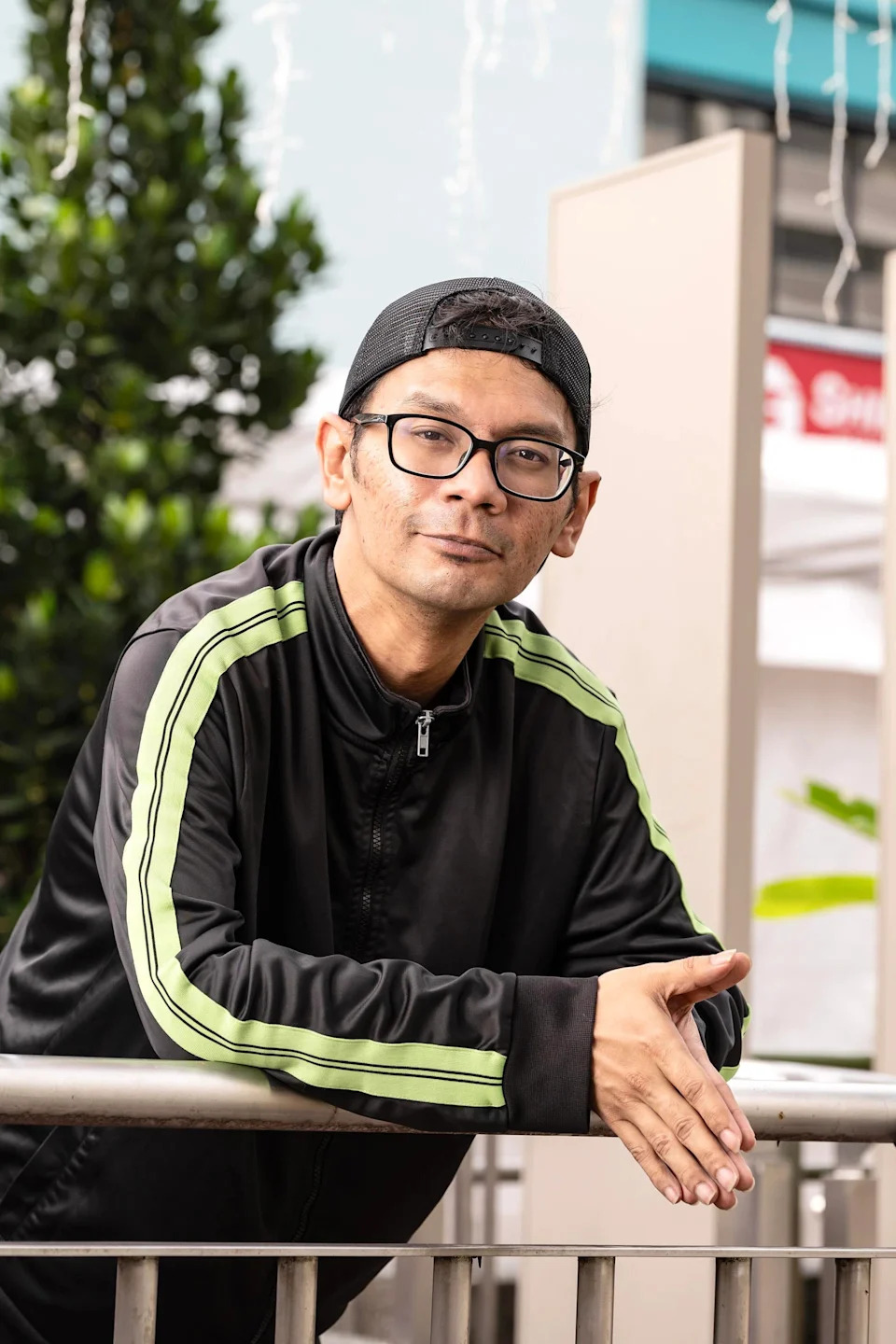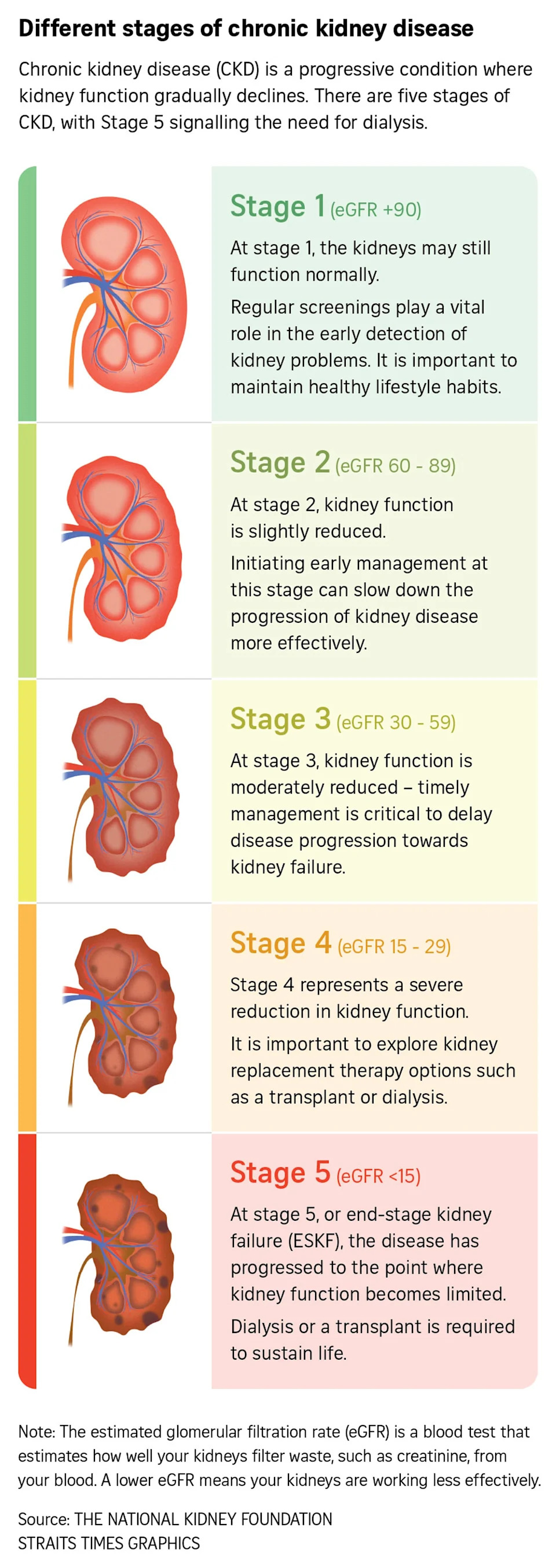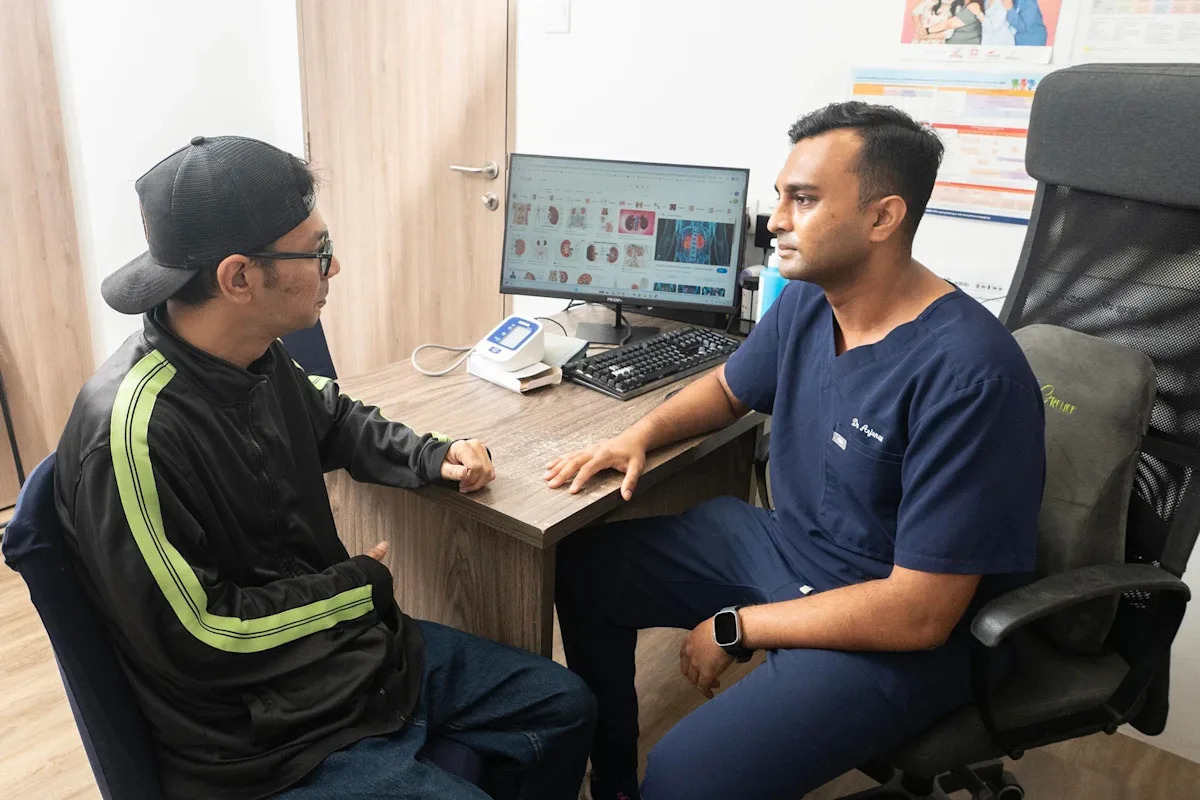SINGAPORE – In March 2025, Mr Syafic Omar felt a tingly feeling in his feet. The feeling continued for two months before he consulted a doctor.
Dr Arjunan Kumaran, a family physician at Intemedical clinic, suspected Mr Syafic might have neuropathy, or problems with his peripheral nerves, and suggested a thorough screening.
Then came the bad news. Not only did the 39-year-old data centre facilities engineer have high blood pressure, high cholesterol levels and diabetes, his kidneys were also starting to fail. Fortunately, his kidney disease was in the early stages.
Mr Syafic is among the more than 500,000 people in Singapore aged 18 to 74 with kidney disease – or more than one in seven people in that age group. Among those aged 70 and older, more than one in three have impaired kidneys.
Kidneys are our body’s waste disposal unit, removing toxins and other wastes, salt and excess water from about half a cup of blood every minute. When this cleaning is hampered, the body suffers from a host of problems such as tiredness, swelling, nausea, shortness of breath and confusion.
There are five stages in chronic kidney disease (CKD), often called a silent killer, as most people feel fine in the early stages. Symptoms generally appear only when the kidneys are quite damaged.
A person needs close monitoring and preparation for a kidney transplant or dialysis when the kidneys are struggling at less than 15 per cent of their normal function. That’s CKD5, or kidney failure.
Dr Jason Choo, medical director of The National Kidney Foundation (NKF), estimates that about half the kidney disease cases in Singapore could have been prevented if chronic conditions such as diabetes, high blood pressure and high cholesterol were diagnosed and controlled early.
While there is no way to reverse kidney damage, he said new medications can significantly delay the deterioration of kidney function if the problem is discovered early.

NKF medical director Jason Choo said new medications can significantly delay the deterioration of kidney function if the problem is discovered early.
For those with CKD, kidney function deteriorates by 10 per cent a year (in healthy people, it’s 0.5 per cent to 1 per cent a year from the age of 30 to 40).
Patients on older medication alone, such as Losartan, can slow the deterioration to 4 per cent, while adding a newer drug, such as SGLT2 inhibitors, can cut it to almost 2 per cent a year.
Patients with kidneys functioning at 60 per cent (CKD2) would need dialysis in about 12 years if they are on just the older medication, and 23 years if they are also on the newer ones. But Dr Choo said factors like overall health and adherence to medication and lifestyle changes affect these numbers.
Mr Syafic is lucky his problem was diagnosed early. Dr Kumaran has already put him on SGLT2 inhibitors, which protect both the heart and kidneys. Dr Choo said about one in three dialysis patients dies of heart conditions.

Mr Syafic Omar, 39, is among the more than 500,000 people in Singapore aged 18 to 74 with kidney disease.
If you already have CKD
People at risk of CKD – those with diabetes, high blood pressure and heart disease; have a family history of CKD; are obese, heavy smokers or frequently take non-steroidal anti-inflammatory drugs such as naproxen, diclofenac and aspirin – should get their kidneys tested.
They can go to more than 200 general practice clinics (https://nkfs.org/kidney-failure/kidney-screening-at-gp-clinics/) that provide NKF’s free test. These normally cost $30 to $50.
Dr Choo said being overweight or obese is a major risk factor for diabetes, cardiovascular disease and kidney failure. Achieving a healthy weight also helps control diabetes and may even result in the disease going into remission.
It is also important for patients to reduce their salt intake to less than 2g a day to help control blood pressure and reduce fluid retention. This, in turn, cuts the workload on already damaged kidneys.
People with CKD3 or CKD4 should also cut their protein intake to reduce stress on their kidneys. The rule of thumb is to consume no more than 0.8g of protein for every 1kg of body weight – or 48g of protein a day for someone who weighs 60kg.
Both the quantity and quality of protein matters. At least half should be “high biological value” proteins which contain all nine essential amino acids, said Dr Choo.
The best proteins for someone with CKD are eggs and plant-based proteins such as soya beans and buckwheat, followed by white meat such as fish and chicken. Red meat such as beef and duck are best avoided or should be eaten as little as possible. While they are good for health, seeds, legumes, grains and nuts lack one or more of the nine amino acids, and should form no more than half the protein intake.
Said Dr Choo: “Plant-based proteins are thought to benefit CKD patients by reduce the formation of harmful substances that stress the kidneys. Plant-based proteins They are also easier to process and promote better gut health compared with animal-based proteins such as red meat.”
The amount of protein does not equate to the weight of the food. About 25 per cent of red meat or poultry is protein. Portion control is important. So if you eat a 200g steak, that contains 50g of protein, you may have hit your daily limit. In comparison, a 50g egg has only 6g of protein.
Moving upstream
What both Dr Choo and The NKF, which provides care to 60 per cent of kidney failure patients, want to see is greater prevention upstream.
Said NKF chairman Ang Hao Yao: “Kidney failure is not inevitable. For many people, it is the result of chronic conditions like diabetes and high blood pressure that develop silently over time. The real opportunity lies upstream.
“This is where NKF wants to shift the needle. Beyond providing high-quality dialysis care, we are strengthening our efforts in early screening, community education and supporting healthier living.
“Our goal is to help Singaporeans stay healthy for as long as possible, not just to treat them when they have kidney failure. When we act early, we give ourselves the best chance at preserving quality of life.”

NKF chairman Ang Hao Yao said NKF wants to “shift the needle”, and help Singaporeans stay healthy for as long as possible, not just to treat them when they have kidney failure.
Two in three cases of kidney disease here are linked to diabetes – compared with fewer than one in five in countries such as Norway, the Netherlands and Italy. Dr Choo said reducing the number of diabetics here could cut the number of people with CKD.
This is why The NKF launched its free kidney screening programme in March 2024 for people who are at risk, such as those with diabetes and high blood pressure, said its chief executive Yen Tan. Of the 5,700 people screened to date, 15 per cent had abnormal results.
She said: “This initiative supports the broader HealthierSG vision. The NKF is now working towards sharing its data with healthcare clusters to strengthen population health management, while ensuring the Foundation’s focus remains on improving overall patient care.”
The Health Ministry’s war on diabetes, launched in 2016, has already resulted in a drop in cases of diabetes-related kidney failure, from 68 per cent in 2019, to 63 per cent in 2024.
The National Population Health Survey 2024 showed that one in two people who have both diabetes and high blood pressure will likely get kidney disease.
The risk falls to 34.4 per cent for those who have only diabetes, and 21.4 per cent for patients with only high blood pressure. For people with neither diabetes nor high blood pressure, the risk is 6.3 per cent.
The survey does not distinguish between people whose chronic conditions are well controlled and those who are not, but Dr Choo said controlling these conditions can significantly delay damage to the kidneys.
The survey found that 16.5 per cent of diabetic adults here do not know they have the disease. Of those diagnosed, only one in three has the problem under control. The largest group with poorly controlled diabetes (81.5 per cent) are people aged 30 to 39.
This special report is supported by The National Kidney Foundation to raise public awareness about protecting kidneys ahead of World Diabetes Day on Nov 14.
For a list of GP clinics that provide kidney screening, go to https://nkfs.org/kidney-failure/kidney-screening-at-gp-clinics/

Source: The Straits Times © SPH Media Limited. Permission required for reproduction

